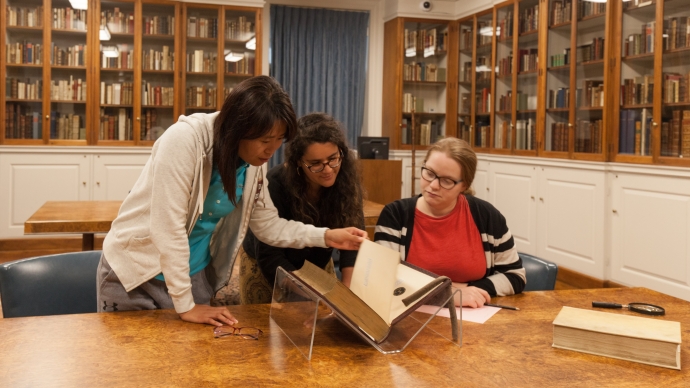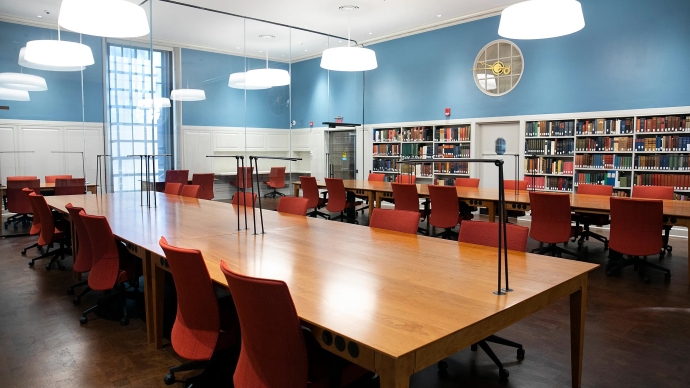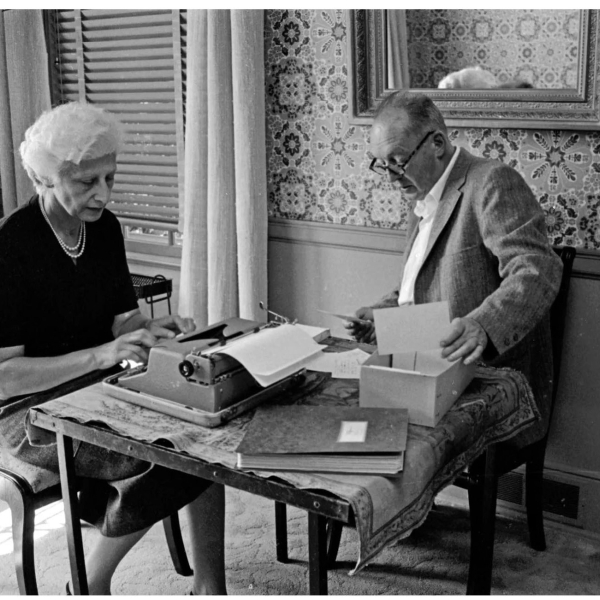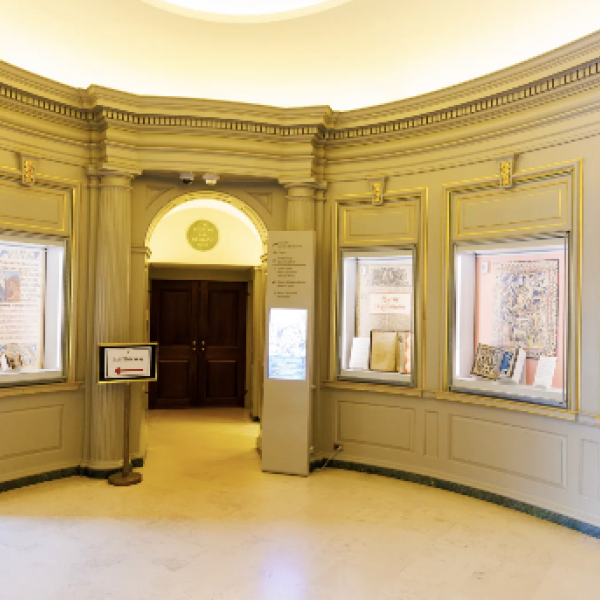Highlights
Home to Harvard’s rare books and manuscripts, literary and performing arts archives, and more: a destination for students, scholars, and the public.
- Teach with primary sources
- Research rare books
- Explore free exhibits
- Attend free events
Fellowships and Prizes
Houghton Library supports research on its collections by scholars, poets, artists, and Harvard University undergraduate students through four annual fellowship programs: Visiting Fellowship, Undergraduate Fellowship, WPR Creative Fellowship, and New England Regional Consortium Fellowship.
Houghton Publications
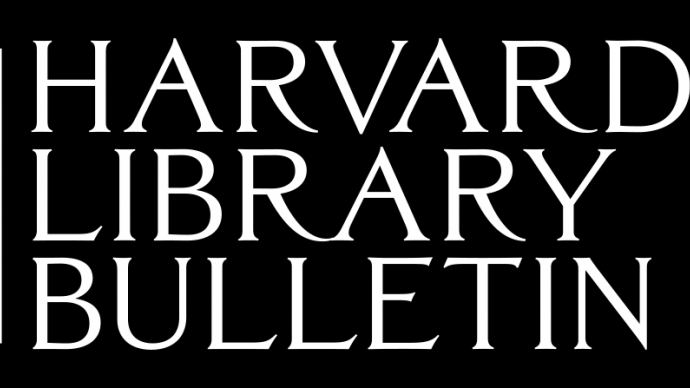
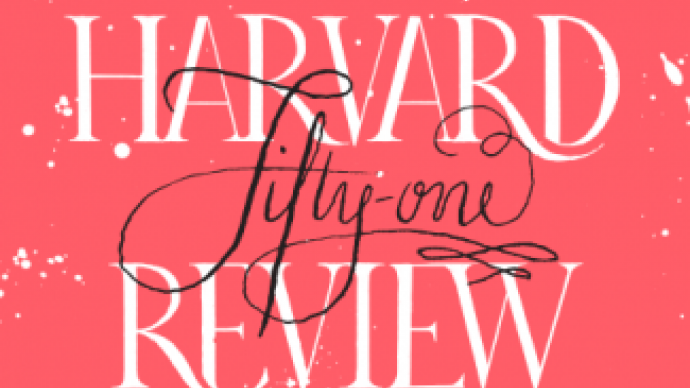
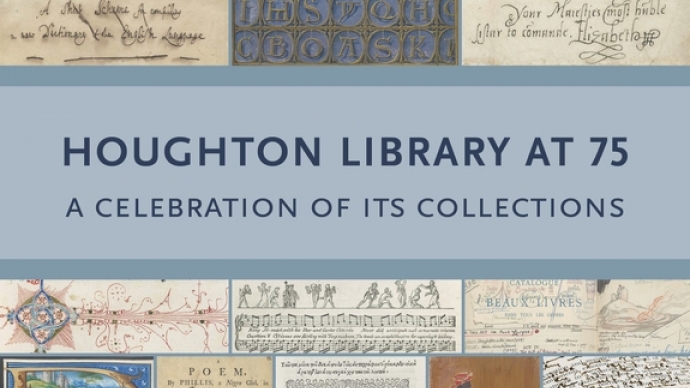
Explore Collections
Since 1942, Houghton’s founding collections have been greatly augmented by a curatorial team whose responsibilities are now divided by period or theme. Today’s curators balance consolidating Houghton’s areas of traditional strength, and forging new directions to better serve the library’s mission to support teaching and research.
Interested in what we've acquired recently? To see some examples, check out what new items have been added to HOLLIS within the past three months
Modern Books and Manuscripts: World Culture, 1800 to Today
Manuscripts, books, photographs, and popular culture material with a focus on literature and history of Europe and the Americas, and Arabic and Indic manuscripts. Additional subjects include the history of missions; the Russian Revolution; publishing history; music; philosophy and much more.
Early Modern Books and Manuscripts
Books, manuscripts and prints from the period 1600-1800. The collection is very broad in scope but particular areas of focus include the history of the Atlantic world, European and American literature, mathematics and physical sciences, and the history of the book.
Early Books and Manuscripts
Material dating from approximately 3000 BCE to 1600 CE and ranging from papyri to early and illuminated manuscripts to early printed books. While there is an emphasis on Western languages and cultures, the collection is also strong in Arabic, Indic, Persian, and Syriac manuscripts.
Harvard Theatre Collection
Rare books, manuscripts, images, ephemera, and audiovisual materials documenting the performing arts, with particular strengths in Anglo-American theater, ballet, opera, music, and historical forms of popular entertainment.
Printing and Graphic Arts
Original artifacts from all periods illustrating the book arts and the materiality and historical development of the book, whether manuscript or printed. Primary emphasis is on books in languages that use the roman alphabet, although the collection includes representative examples from other cultural traditions.
Woodberry Poetry Room
The Woodberry Poetry Room is a warm, welcoming poetry library and landmark audio-visual archive featuring over 5,000 spoken voice recordings, located in Lamont Library and overseen by Houghton Library.
Copyright Questions
The vast majority of Houghton material is either in the public domain or under copyrights not controlled by Houghton Library.
Houghton Library does not require that researchers request permission to quote from or publish images of most collection material (a few exceptions are listed below), nor does it charge permission or use fees. Permission, however, may be needed from other copyright holders or executors.
When to Contact Us
Please notify the library if you plan to publish facsimile editions of Houghton materials, and for articles, editorial projects, biographical and critical works that incorporate a substantial portion of a manuscript and/or collection. The library may wish to receive a copy of such works for its records.
Researchers must notify the library when publishing images of or quoting from the collections listed below. The list includes the major collections for which these conditions apply, but it’s not exhaustive. Please email the library with any questions.
- American Board of Commissioners for Foreign Missions (ABCFM)
- American Repertory Theatre
- Thomas Bouchard
- Emily Dickinson
- Ralph Waldo Emerson
- Bernie Gardella
- Joseph Clark Grew
- Iranian Oral History Project
- Sally Jacobs
- Alix Jeffry
- Frederick Kiesler
- John Lindquist
- Amy Lowell
- Angus McBean
- L.E. Sissman
- Andrei Sakharov Archives
- Arks Smith
- Tobi Tobias
- Thomas Wolfe*
*There can be no reproduction or publication of material in these collections without advance permission from the copyright holder.
Any requests to write up or publish T. S. Eliot’s material must be cleared through Faber’s Permissions Department.
For material protected by copyright, certain uses (including but not limited to quoting, publishing, performing, and reproducing) may require permission from the copyright holder. When required, it’s the researcher’s responsibility to obtain such permissions.
The following resources may be helpful in this regard:
- Copyright Term and the Public Domain in the United States, published by the Cornell University Copyright Information Center, can help researchers to determine if a work is in the public domain.
- Harvard University's Office of Scholarly Communications Fair Use Guide explains fair use and gives advice on determining if your use of a copyrighted item falls under the fair use statue.
Several online resources can be useful in finding the current copyright holder of a work, and requesting licensing permission:
- The WATCH File (Writers, Artists, and Their Copyright Holders) maintained by the Harry Ransom Center and the University of Reading is a database of copyright contacts for writers, artists, and prominent figures in other creative fields.
- Artists Rights Society is a copyright, licensing and monitoring organization for visual artists in the United States.
- DACS is a visual artists’ rights management organization in the United Kingdom.
- The ADAGP is a French collective which monitors copyright in the visual arts.
- ASCAP and BMI are performing rights organizations which license and collect royalties for musical works.
Citations
Houghton Library asks that researchers cite all material referenced, quoted, or reproduced with the following citation format:
[Call number]. Houghton Library, Harvard University.
For example, a photograph reproduced from the Henry James papers would be cited as: MS Am 1094 (2245). Houghton Library, Harvard University.
Exhibition Loans
Houghton Library considers loan requests on a rolling basis. If you would like to submit a request for an exhibition loan, please complete this form. Please note that we require requests from external borrowers at least 12 months prior to the exhibition opening date and requests from Harvard campus affiliates at least 6 months prior to the exhibition opening date. If you have any other questions, contact Houghton Library’s Registrar, Carie McGinnis.
Teaching at Houghton
Student Research Fellowships
Are your students interested in research on special collections or collectors themselves? They can apply for Houghton Library Undergraduate Fellowships or the Philip Hofer Prize for Collecting Books or Art.
Exhibits and Events
Online Exhibitions
- Face to Face: Portraits of People of Color Before Photography
- Animals Are Us: Anthropomorphism in Children's Literature; Celebrating the Peter J. Solomon Collection
- Such a Curious Dream! Alice's Adventures in Wonderland at 150
- Books in Books: Reflections on Reading and Writing in the Middle Ages
- Picturing Prayer: Books of Hours in Houghton Library
- Boston's Crusade Against Slavery"
- Let Satire Be My Song:" Byron's English Bards, and Scottish Reviewers
- Diaghilev's Ballet Russes, 1909-1929: Twenty Years that Changed the World of Art
- Open House 75: Houghton Library Staff Select
- HIST 75H: A Masterclass on Houghton Library
- "Life is in the Transitions:" William James, 1842-1910
- A Monument More Durable than Brass: The Donald and Mary Hyde Collection of Dr. Samuel Johnson
- "I Shall Ever Be Your Dearest Love:" John Keats and Fanny Brawne
- Harvard's Lincoln
- Public Poet, Private Man: Henry Wadsworth Longfellow at 200
- Private Proust: Letters and Drawings to Reynaldo Hahn
- The Adventures of Thackeray in his Way Through the World: His Fortunes and Misfortunes, His Friends and Family
- History of the Harry Elkins Widener Library
Upcoming Events & Workshops
Lecture Series
Each year Houghton Library invites distinguished scholars to deliver four lectures in honor of George Parker Winship, and Philip and Frances Hofer. The lectures are free and open to the public.
Join our mailing list for updates on Winship, Hofer and other public programs happening at Houghton.
Philip and Frances Hofer Lectures on the Art of the Book

The Philip and Frances Hofer Lecture Series was established in 1968 for the purpose of sponsoring “lectures on subjects of special interest to Harvard students and scholars within the range of the Printing and Graphic Arts field.”
Philip Hofer — Harvard College class of 1921 and founding curator of Houghton's Department of Printing and Graphic Arts — endowed the lecture fund in his name and that of his wife on the occasion of his retirement from Houghton Library.
In addition to the Hofer Lecture Series, Houghton Library in conjunction with the Harvard Art Museum awards an annual Philip Hofer Prize for Collecting Books or Art.
George Parker Winship Lectures on Bibliography
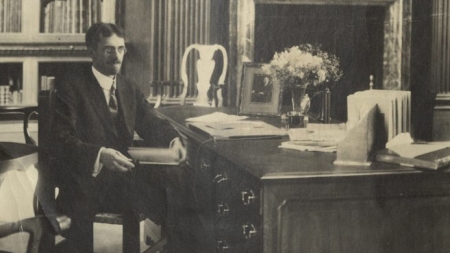
The Winship Lectures were established in 1968 by a gift from the John Barnard Associates, a society of Harvard book-lovers founded in 1927 by Winship. For further information on Winship and the history of the lecture series, see:
George Parker Winship as Librarian, Typophile and Teacher, edited by Roger Stoddard. Cambridge [Mass.]: The Harvard College Library, 1999.
"The George Parker Winship Lecture Series at Houghton Library: A Bibliographer’s Creed", by G. Thomas Tanselle. Harvard Library Bulletin.Spring 2014, Volume 25, Number 1.
About Houghton Library
Welcome
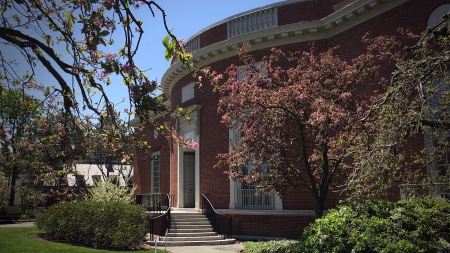
About Houghton
Houghton Library opened in 1942 to provide a dedicated home for Harvard Library’s rapidly growing collections of rare books and manuscripts. Since then, it has become known as a research center and a setting for hands-on learning and vibrant public programs.
Who We Are
At Houghton, our work is guided by Harvard Library’s core mission “to advance the learning, research and pursuit of truth that are at the heart of Harvard.” In service of that mission, we collect rare books, manuscripts, archives, and other cultural materials in areas of historic strength as well as in areas of emerging scholarly interest.
As a library, we seek to provide access to all who are interested in our collections, programs, and expertise. To this end, we pursue innovative strategies within an ever-evolving information landscape, exercising flexibility, adaptability, and open-mindedness. The library is powered by the expertise and dedication of our staff, each of whom plays a vital role in all we do.
What We Do
- Provide access to special collections
- Perform reference and research consultations
- Teach with primary sources
- Acquire, catalog, process, and preserve rare books, manuscripts, archives, and more
- Digitize collection materials to preserve and make them more widely accessible
- Support research at Harvard and beyond through four fellowship programs
- Organize and host dynamic public programs, including exhibitions, lectures, poetry readings, and symposia
- Publish scholarly and literary journals: Harvard Library Bulletin and Harvard Review
- Maintain an active national and international loan program
- Conduct tours of the building every Friday
For updates on Houghton, sign up for our newsletter, follow us on Instagram, or subscribe to our YouTube channel.
Accessibility of Houghton Library
- The main entrance to Houghton Library via Quincy Street is accessible by automatic door and ramp.
- Restrooms are located on the ground floor, are wheelchair accessible, and are gender inclusive.
- The Houghton Reading Room has adjustable-height chairs and one adjustable-height table.
- Exhibition spaces and classrooms can be accessed by elevator.
- With advance notice, we can arrange accommodations for event and lecture attendees. We are also happy to discuss private exhibition tours for groups requiring accommodations.
Contact Houghton Library with questions about accessibility of elevators, the reading room/classrooms, and restrooms.
Media & Recording Requests
Houghton Library is committed to supporting and promoting research, teaching, and learning, while at the same time preserving our rare and unique collections.
Houghton Library is not available as a background setting for non-educational, non-collection-related projects or promotions.
Filming and recording on-site at Houghton Library may be accommodated when:
- A Harvard faculty member requests filming as part of their teaching program;
- The University or Faculty of Arts and Sciences (FAS) Administration requests filming to promote education and/or teaching with the Harvard collections; or
- A request from outside Harvard is for an educational project in which Houghton Library collections are integral.
All filming, recording or media requests should be made at least two weeks in advance. Submit your request through the Harvard Library Communications Media Request Form.
Copyright Questions
The vast majority of Houghton material is either in the public domain or under copyrights not controlled by Houghton Library.
Houghton Library does not require that researchers request permission to quote from or publish images of most collection material (a few exceptions are listed below), nor does it charge permission or use fees. Permission, however, may be needed from other copyright holders or executors.
When to Contact Us
Please notify the library if you plan to publish facsimile editions of Houghton materials, and for articles, editorial projects, biographical and critical works that incorporate a substantial portion of a manuscript and/or collection. The library may wish to receive a copy of such works for its records.
Researchers must notify the library when publishing images of or quoting from the collections listed below. The list includes the major collections for which these conditions apply, but it’s not exhaustive. Please email the library with any questions.
- American Board of Commissioners for Foreign Missions (ABCFM)
- American Repertory Theatre
- Thomas Bouchard
- Emily Dickinson
- Ralph Waldo Emerson
- Bernie Gardella
- Joseph Clark Grew
- Iranian Oral History Project
- Sally Jacobs
- Alix Jeffry
- Frederick Kiesler
- John Lindquist
- Amy Lowell
- Angus McBean
- L.E. Sissman
- Andrei Sakharov Archives
- Arks Smith
- Tobi Tobias
- Thomas Wolfe*
*There can be no reproduction or publication of material in these collections without advance permission from the copyright holder.
Any requests to write up or publish T. S. Eliot’s material must be cleared through Faber’s Permissions Department.
For material protected by copyright, certain uses (including but not limited to quoting, publishing, performing, and reproducing) may require permission from the copyright holder. When required, it’s the researcher’s responsibility to obtain such permissions.
The following resources may be helpful in this regard:
- Copyright Term and the Public Domain in the United States, published by the Cornell University Copyright Information Center, can help researchers to determine if a work is in the public domain.
- Harvard University's Office of Scholarly Communications Fair Use Guide explains fair use and gives advice on determining if your use of a copyrighted item falls under the fair use statue.
Several online resources can be useful in finding the current copyright holder of a work, and requesting licensing permission:
- The WATCH File (Writers, Artists, and Their Copyright Holders) maintained by the Harry Ransom Center and the University of Reading is a database of copyright contacts for writers, artists, and prominent figures in other creative fields.
- Artists Rights Society is a copyright, licensing and monitoring organization for visual artists in the United States.
- DACS is a visual artists’ rights management organization in the United Kingdom.
- The ADAGP is a French collective which monitors copyright in the visual arts.
- ASCAP and BMI are performing rights organizations which license and collect royalties for musical works.
Citations
Houghton Library asks that researchers cite all material referenced, quoted, or reproduced with the following citation format:
[Call number]. Houghton Library, Harvard University.
For example, a photograph reproduced from the Henry James papers would be cited as: MS Am 1094 (2245). Houghton Library, Harvard University.
Exhibition Loans
Houghton Library considers loan requests on a rolling basis. If you would like to submit a request for an exhibition loan, please complete this form. Please note that we require requests from external borrowers at least 12 months prior to the exhibition opening date and requests from Harvard campus affiliates at least 6 months prior to the exhibition opening date. If you have any other questions, contact Houghton Library’s Registrar, Carie McGinnis.
